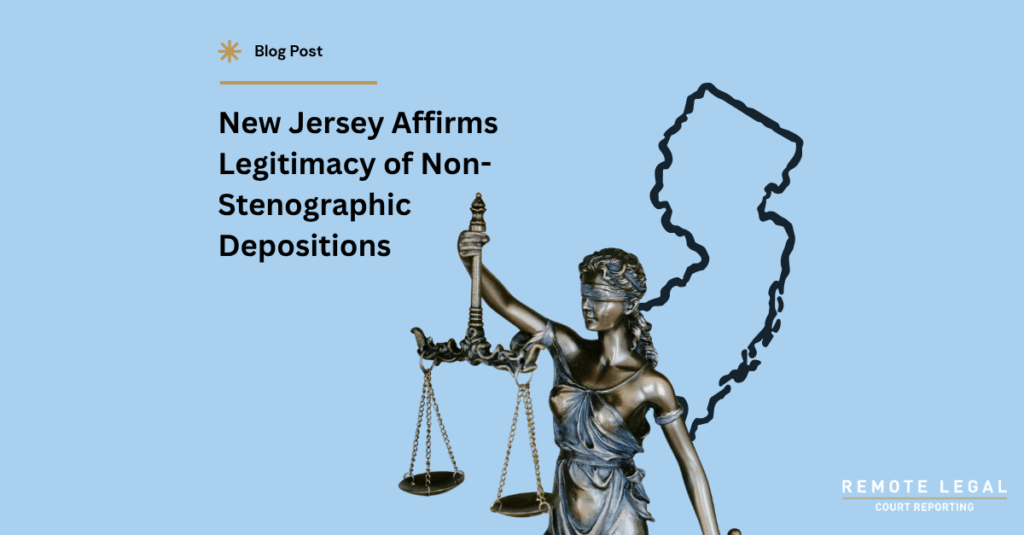From Uncertainty to Clarity: New Jersey Affirms Legitimacy of Non-Stenographic Depositions

Picture this: you have just completed a remote deposition using your preferred court reporting firm. The transcript arrives certified and ready. Then, opposing counsel files a motion to strike your transcript, arguing that it should be thrown out because the court reporter was not a certified stenographer by the state of New Jersey.
You are caught off guard. You did not realize this distinction could even matter, and you chose remote depositions to make your work simpler, not riskier.
This exact situation happened in New Jersey, and the outcome is important for every litigator who relies on remote depositions today.
The Case: OGC Solutions and the Challenge to Digital Court Reporting
OGC Solutions, an Outside General Counsel law firm, used Remote Legal to conduct a deposition. After the proceeding, all counsel received the transcript and OGC Solutions requested a neutral review to confirm the transcript’s accuracy. Upon review, it was found that the deponent had softly muttered some comments, which had been captured on the video recording, but had been missed in real time.
Realizing that the amended certified transcript contained testimony unfavorable to their client, opposing counsel attempted to have it thrown out entirely. They filed a motion to strike the deposition, arguing that it was invalid because it had been captured by a digital court reporter rather than a certified New Jersey stenographer.
When OGC Solutions reviewed the applicable laws and rules, they found a confusing mix of guidance from different authorities. For example, the New Jersey Board of Court Reporting claims that certified court reporters need to be certified in the state of New Jersey. But is that really true?
What New Jersey Court Rules Actually Say
The official New Jersey Court Rules paint a much clearer picture.
Under Rule 4:13(a):
“Unless the court orders otherwise, the parties may by written stipulation provide that depositions may be taken before any person, at any time or place, upon any notice, and in any manner and when so taken may be used like other depositions.”
This rule allows depositions to be taken before any qualified person in any manner, as long as both parties agree in writing. That includes nationally certified digital court reporters who are not necessarily certified by the state of New Jersey.
Additionally, Rule 4:14-5 explains what happens based on the officer’s certification:
“If the officer is a certified shorthand reporter, the witness shall not sign the deposition. If the officer is not a certified shorthand reporter, then unless reading and signing are waived by stipulation, the witness must sign the deposition after review.”
This means digital court reporters are permitted under the rules. The key procedural requirement is that the witness either signs the deposition or both parties agree to waive signing.
To ensure compliance and credibility, litigators should work with certified digital reporters, such as those credentialed by the American Association of Electronic Reporters and Transcribers (AAERT), and choose a court reporting firm that takes procedural accuracy seriously.
What Happened in Court
When opposing counsel moved to strike the transcript, Remote Legal defended its client, OGC Solutions, in the Middlesex County trial court.
The defense was straightforward:
- Remote Legal’s digital reporters are certified under AAERT standards.
- OGC Solutions adequately notified their opposing counsel about the method for capturing the record
- Both parties had stipulated that the record be captured by audio, audio/visual, or stenographic means
- The proceeding began with an on-record Read-On confirming that agreement.
The court agreed. It ruled that the deposition was admissible and in full compliance with New Jersey’s procedural rules.
“The court finds that the manner in which [Remote Legal] conducted the depositions using computer hardware and software to transcribe the testimonies audially captured is permitted under Rule 4:13(a) and not in violation of N.J.S.A. 45:15B-9,” stated the judge.
The decision also made it clear that the New Jersey Board of Court Reporting regulates only stenographers, not digital reporters. The New Jersey Board of Court Reporting has chosen not to allow digital court reporters to become certified by the state of New Jersey, and therefore they are not able to regulate digital court reporters.
What Litigators Should Take Away
This case provides two key takeaways for attorneys using remote deposition platforms:
- The New Jersey Board of Court Reporting doesn’t regulate digital court reporting.
- While the New Jersey Board of Court Reporting may weigh in on digital court reporting, its authority extends only to stenographers. The court ruled that the court rules —not board guidelines—govern deposition procedure in New Jersey. However, this difference between what the board says and what the rules say may cause confusion. Opposing counsel may attempt to exploit this confusion and challenge testimony.
- Choosing the right partner makes all the difference.
- Remote Legal protects the record through certified professionals, clear stipulations, and tested compliance protocols.
Even when local interpretations seem unclear, the rules are on your side when you partner with Remote Legal.
The Bottom Line
The OGC Solutions case is more than a courtroom win. It confirms that digital court reporting, when done correctly, is legally sound and procedurally compliant.
If your opposing counsel ever questions the legitimacy of your transcript, remember:
You are protected. Your record is valid. And Remote Legal stands behind it.
Want more content like this?
Subscribe to our newsletter to receive to get our latest blogs in your inbox.
See Remote Legal in Action
Let us show you our single source solution so you can get back to doing the things you love.